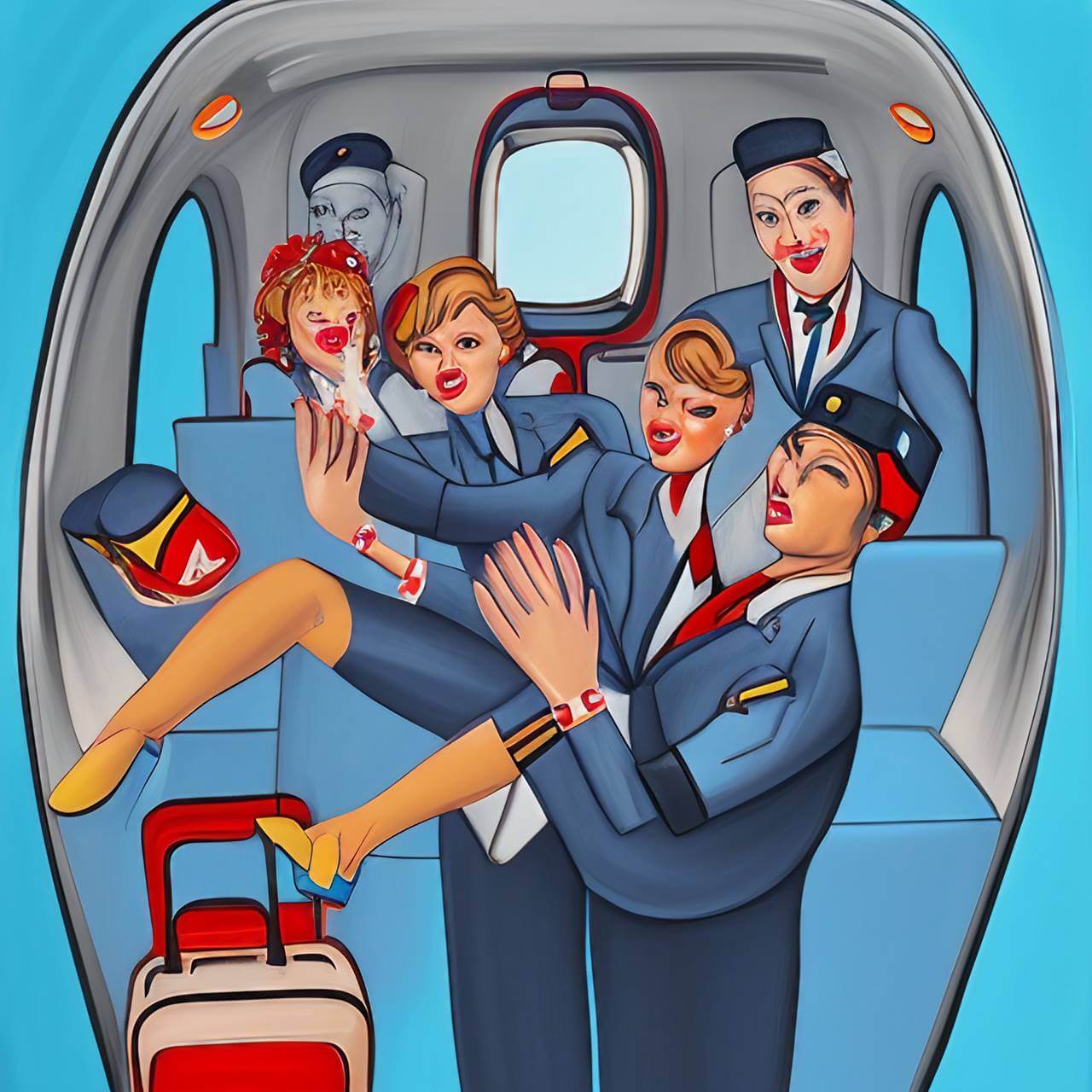The training for flight attendants is very intense and it is important to be prepared for it. In order to become a flight attendant, you must attend a training program that is approved by the Federal Aviation Administration (FAA). The program will usually last around two to three months, during which you will learn all about the duties of a flight attendant, safety procedures, and how to handle emergencies.
The first few days of the program are usually dedicated to learning about the history of aviation and the role of flight attendants. You will also learn about the different types of aircrafts and how to operate the cabin equipment. In addition, you will receive training in first aid and CPR.
The remainder of the program is focused on safety procedures. You will learn how to deal with emergencies such as fires, depressurization, and loss of cabin pressure. You will also learn how to evacuate passengers from an aircraft in the event of an emergency. In addition, you will be taught how to handle dangerous goods and how to deal with unruly passengers.
By the end of the program, you should be fully prepared to work as a flight attendant.
Also Read: A Day in the Life of a Flight Attendant
Contents
- The Process of Becoming a Flight Attendant
- How Many Hours of Training do you Need
- What Type of Things Will You Learn in Training
- How to Pass the Cabin Crew Training
- Will you be able to Travel for Free Once you’re a Flight Attendant?
- Benefits to Becoming a Flight Attendant
- Some Common Myths about Being a Flight Attendant
- Duties and Responsibilities after Training?
- Summary

The Process of Becoming a Flight Attendant
Becoming a flight attendant is no easy feat. After applying and passing the initial application process, candidates attend a training program that lasts several weeks, where they learn everything from safety procedures to first aid to emergency drills.
Next, they are evaluated during simulated flights with instructors and airline executives before finally being given their wings. Even after all of this, flight attendants must continue to practice and refresh their training regularly. And while it may seem like a tough and demanding job, the rewards are countless. From traveling the world to meeting new people every day, becoming a flight attendant opens up a world of opportunity.
So grab your suitcase and get ready for takeoff – the journey to becoming a flight attendant is an exciting one!
Also Read: How to Prepare for Flight Attendant Training
How Many Hours of Training do you Need
Becoming a flight attendant requires more than just a pretty smile and the ability to walk up and down narrow airplane aisles. The training process for flight attendants can be quite rigorous and time-intensive. New hires typically need to complete somewhere between three to six weeks of initial training, where they learn on-the-job skills such as safety procedures and emergency drills.
They also attend classes on customer service, cultural sensitivity, and foreign languages. And even after the initial training period is over, flight attendants continue to receive regular ongoing training to stay current with industry changes and regulations.
So while the exact number of hours required may vary somewhat between airlines, it’s safe to say that becoming a flight attendant requires a significant investment of both time and effort.
Also Read: How Many Days Do Flight Attendants Work?
What Type of Things Will You Learn in Training
Becoming a flight attendant requires rigorous training, but the result is worth it. In training, you will learn both practical skills and important safety procedures. You’ll learn how to properly serve drinks and meals to passengers, operate emergency equipment, and handle difficult situations such as medical emergencies or passenger disturbances.
In addition, you will gain a deeper understanding of aviation laws and regulations, as well as international travel rules and customs. Training also includes physical exercises such as evacuation demonstrations, preparing you for any potential in-flight emergencies.
Overall, becoming a flight attendant involves much more than just serving drinks and snacks – it requires dedication and attention to detail to ensure the safety of both yourself and the passengers. The training process for flight attendants is very extensive to ensure they can handle any situation that might come up during a flight. (Of course, there’s also plenty of fun included – you’ll gain insider knowledge on the best places to visit during layovers!)
So if you’re ready for an exciting career with plenty of opportunities for travel and personal growth, consider enrolling in flight attendant training.
Also Read: Reasons Why You Don’t Need to Attend a Flight Attendant School

How to Pass the Cabin Crew Training
The cabin crew training course is designed to test your knowledge and skills, as well as prepare you for the job. To pass the training, there are some key steps you should follow:
1. Study Hard: The first step is to prepare for the exam by studying hard. Familiarize yourself with safety procedures, customer service protocol, international travel rules and regulations, cultural sensitivity and foreign languages.
2. Practice Makes Perfect: Once you have studied hard, it’s time to practice. Take part in mock drills and emergency scenarios to ensure you can handle any situation that might come up during a flight. Also work on your physical ability – make sure you can easily walk up and down narrow airplane aisles!
3. Pay Attention to Detail: The cabin crew training course requires attention to detail. Make sure you can name off all the emergency equipment and procedures quickly and accurately.
4. Be Confident: Finally, remember to stay confident during the exam and throughout your job as a flight attendant. You know how to handle yourself in any situation – now it’s time to show off your skills!
By following these steps, you will be well-prepared for the cabin crew training course as well as the exciting career that awaits you afterwards! With dedication, hard work and a bit of luck, you’ll be able to pass the training with flying colors. Good luck!
Will you be able to Travel for Free Once you’re a Flight Attendant?
One of the first things people ask about becoming a flight attendant is whether or not they’ll be able to travel for free. The answer is yes…and no. While you will be able to get reduced rates on airfare as a flight attendant, you won’t be able to fly for free. To qualify for lower rates, you’ll need a buddy pass. A buddy pass is a free or reduced-rate ticket that you can give to someone else, like a friend or family member.
You can fly for free only if you have an employee travel pass. An employee travel pass allows you to fly for free on any partner airline, at any time. However, these passes are very limited and are typically only given to flight attendants who have been with an airline for a long period.
So while you won’t be able to fly for free as a flight attendant, you will enjoy lower airfare rates. And if you’re lucky enough to snag an employee travel pass, you’ll be able to fly for free on any airline.
Benefits to Becoming a Flight Attendant
Becoming a flight attendant involves undergoing a rigorous training program, but the job offers more than just the thrill of traveling the world. In addition to meeting new people and experiencing different cultures, flight attendants have access to a variety of perks and benefits. Many airlines offer discounts for flights for employees and their families, allowing for inexpensive travel opportunities.
Moreover, many flight attendants receive cross-training in skills such as CPR or emergency evacuation procedures, providing valuable life-saving knowledge. Flight attendants also receive competitive wages and are often provided with meals during shifts. With all these benefits in mind, pursuing a career as a flight attendant may be worth considering for any enthusiastic traveler looking to explore the world while also enjoying job stability and perks.

Some Common Myths about Being a Flight Attendant
One common myth about being a flight attendant is that the job is easy and there are no requirements to become one. The reality is that the process of becoming a flight attendant is highly selective and rigorous. Not only do potential attendants usually need customer service experience and fluency in multiple languages, but they often go through weeks or months of training that covers everything from safety procedures to deal with difficult customers.
And once on the job, flight attendants work long hours, often with grueling schedules and little time for breaks.
Another myth is that all flight attendants are young and single. In reality, many have families and significant others, as well as other careers or passions outside of their jobs as flight attendants. So while it may be glamorous at times, being a flight attendant requires hard work and dedication just like any other profession.
Also Read: 11 Things Flight Attendants Hate about the Job
Duties and Responsibilities after Training?
After training, flight attendants have various duties and responsibilities. Daily, they must ensure passenger safety by performing required safety checks and demonstrating emergency protocols. They also have to assist passengers with any needs or concerns during the flight, such as providing snacks or handling medical emergencies.
In addition, they are responsible for keeping the cabin organized and presentable. This includes stocking supplies, cleaning up after meals, and assisting with baggage storage. Being a flight attendant means that you should always be ready for unexpected situations while providing excellent customer service at all times. The journey to becoming a fully trained member of the flight crew demands hard work and diligence, but the rewards are numerous for those who persevere.

Summary
Overall, becoming a flight attendant is a demanding process but offers many rewards. From the competitive pay and benefits to the opportunity to travel the world, flight attendants can enjoy an exciting and enriching career. If you have a passion for customer service and are interested in exploring new places, then a career as a flight attendant may be the perfect fit for you.